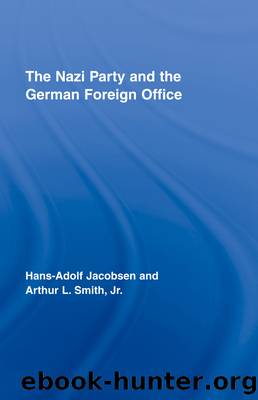The Nazi Party and the German Foreign Office by Hans-Adolph Jacobsen Arthur L. Smith Jr

Author:Hans-Adolph Jacobsen, Arthur L. Smith Jr. [Hans-Adolph Jacobsen, Arthur L. Smith Jr.]
Language: eng
Format: epub
Tags: History, General, Europe, Germany, Military, World War II, Modern, Political Science, Social Science
ISBN: 9781135906726
Google: lKtufY98NzAC
Publisher: Routledge
Published: 2012-08-21T01:16:27+00:00
9 Administrative Problems
To many Germans who advanced to positions of prominence and authority with the advent of the Hitler regime, the experience must have had an occasional sense of unreality at times. The speed with which Germany was transformed from a nation trying to recover from war, inflation, and depression into a country with a thriving economy and renewed international prestige, was very impressive. Many outside observers, however, pointed to the oppressive measures that were being introduced into German life by the dictatorial regime. Others choose to overlook the persecution of political foes of National Socialism, and the brutal treatment of racial and religious minorities, as the price to be paid for economic recovery. For Ernst Wilhelm Bohle, whose earlier prospects for a successful career in business or government had looked bleak in 1930, Adolf Hitler and the National Socialist movement proved a blessing.
Some of the credit was due his own ability to recognize an opportunity, and be in the right place at the right time, but his success was also a reflection of Germanyâs rapid economic recovery and the expansionist policies of the Hitler dictatorship. It was a time of opportunity for many in the Nazi Party, and while Bohle had the advantage of a powerful mentor in Rudolf Hess, it was no guarantee that he could avoid the invidious politics that permeated not only the leadership, but also the rank and file of the party. Bohle was a quick learner, however, and quickly proved adept at skirting the pitfalls that had relegated some of his colleagues to minor posts and career oblivion.
Although the young Gauleiter had no background in government administration or managing a large organization, he was able to recognize almost from the beginning, what the pursuits were that would enhance his position as the leader of the Auslandsorganisation He was fully aware that a major concern of Hitlerâs in developing foreign policy, focused upon Austria, Czechoslovakia, and the Polish Corridor, and he also knew that these areas had a history and leaders that did not require much direction from the Auslandsorganisation, however, he was not inclined to pass up an opportunity to involve himself in diplomatic affairs. He was able to take advantage of his position as Gauleiter of the AO, and his appointment as a state secretary in the Foreign Office, to inject himself at certain times into on-going diplomatic negotiations in both Austria and Czechoslovakia. Leading up to the annexation of Austria in March 1938, and the dismemberment of Czechoslovakia in 1938â1939, Bohle conferred with the foreign ministers of both of those nations on certain aspects of Nazi Party activity in their countries. This did not mean, however, that he was privy to what Hitlerâs intentions were toward these countries, and claimed he knew nothing in advance of the plan for annexing Austria, insisting that it was Ribbentropâs doing â... that I had to be kept out of foreign policy altogether.â1 Actually, the Auslandsorganisation der NSDAP had been openly involved with the Austrian Nazis until their failed attempt to take control of the government in 1934.
Download
This site does not store any files on its server. We only index and link to content provided by other sites. Please contact the content providers to delete copyright contents if any and email us, we'll remove relevant links or contents immediately.
The European Opportunity by Felipe Fernández-Armesto(586)
The European History Highway: A Guide to Internet Resources by Dennis A. Trinkle Scott A. Merriman(543)
The Seven Wonders of the Ancient World by Michael Denis Higgins(530)
Morgan Kaufmann Digital Watermarking and Steganography by Ingemar Cox Matthew Miller Jeffrey Bloom Jessica Fridrich Ton(530)
European Security without the Soviet Union by Stuart Croft Phil Williams(513)
Hyperculture by Byung-Chul Han(512)
The Routledge companion to Christian ethics by D. Stephen Long Rebekah L. Miles(510)
European Security in a Global Context by Thierry Tardy(507)
Get Real with Storytime by Julie Dietzel-Glair & Marianne Crandall Follis(451)
Hudud Al-'Alam 'The Regions of the World' - a Persian Geography 372 A.H. (982 AD) by V. V. Minorsky & C. E. Bosworth(440)
Tibetan Studies in Comparative Perspective by Chih-yu Shih Yu-Wen Chen(437)
Gorbachev And His Generals by William C. Green(430)
Governance, Growth and Global Leadership by Espen Moe(428)
CliffsNotes on Fitzgerald's The Great Gatsby by Kate Maurer(415)
How Languages Are Learned 5th Edition by Patsy M Lightbown;Nina Spada; & Nina Spada(410)
The Egyptian Economy, 1952-2000 by Khalid Ikram(389)
The Oxford History of the World by Fernández-Armesto Felipe;(388)
The Oxford Handbook of the Incas by Sonia Alconini(374)
Oral Poetry and Narratives from Central Arabia: The Poetry of Ad-Dindan : A Bedouin Bard in Southern Najd (Studies in Arabic Literature, Vol 17) (English and Arabic Edition) by P. M. Kupershoek P. Marcel Kurpershoek(368)
